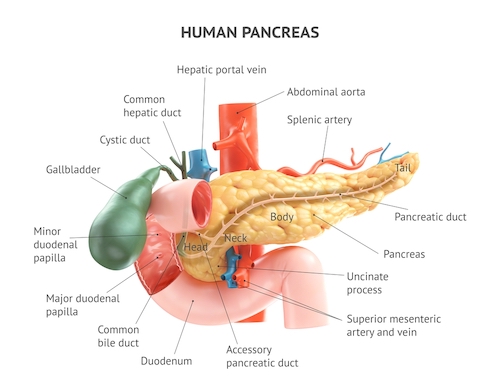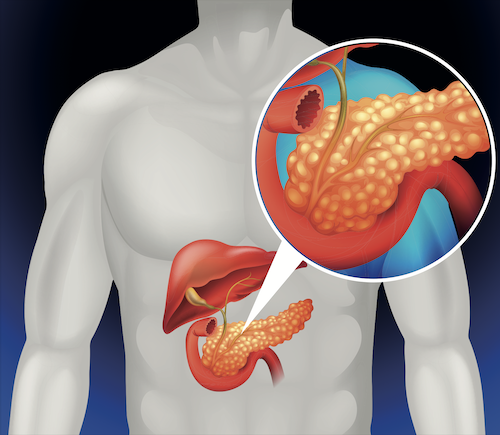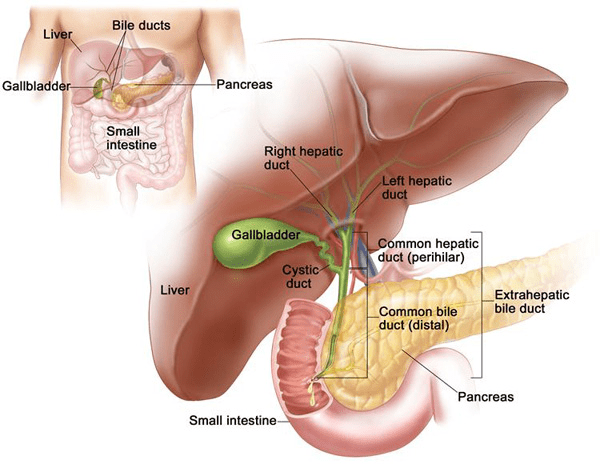Hepato-pancreato-biliary (HPB) surgery encompasses various procedures that treat conditions in the liver, bile system, and pancreas.
Pancreatic cancer is a tough and severe cancer prognosis. Of all the major cancers, pancreatic has one of the worst survival durations. The survival length of untreated advanced-stage pancreatic cancer is around 3.5 months. Early diagnosis and treatment are critical for effective treatment. One of the most complex surgical procedures performed, hepato-pancreato-biliary surgery, is the best chance to cure the condition.
HPB Surgery at The Surgical Clinic
The Surgical Clinic in Tennessee is at the forefront of Hepatopancreaticobiliary (HPB) surgery, providing a comprehensive range of services dedicated to treating disorders of the liver, pancreas, and biliary system. Our team of highly specialized surgeons offers a blend of expertise, innovation, and compassion for all our patients.
When possible, TSC offers minimally invasive laparoscopic surgery options for HPB conditions. Laparoscopic surgery is a cutting-edge approach that involves smaller incisions, reduced post-operative pain, shorter hospital stays, and quicker recovery times compared to traditional open surgery. The clinic’s skilled HPB surgeons utilize advanced laparoscopic techniques to perform procedures such as cholecystectomy (gallbladder removal), liver resection, and pancreatic surgery with precision and care.
Patients who choose The Surgical Clinic for HPB diagnosis and treatment can trust that they will receive the most advanced, patient-centered care available. Whether it’s the treatment of liver and pancreatic cancers, complex bile duct conditions, or other HPB disorders, the clinic’s dedication to staying at the forefront of medical advancements ensures that patients have access to the latest innovations in surgical care. With a focus on enhancing the quality of life for their patients, The Surgical Clinic in Tennessee continues to be a trusted destination for those seeking excellence in HPB surgery.
Learn more about pancreatic cancer and general surgery treatment from The Surgical Clinic in Tennessee below.
What is Hepato-Pancreato-Biliary Surgery for Pancreatic Cancer?
Primarily, hepato-pancreato-biliary surgery (also called hepatobiliary surgery) addresses cancer, though it can also treat non-cancerous illnesses. Tumors can occur in the liver, pancreas, and bile ducts, which can be benign or malignant. When tumors in other regions of the body, such as the colon, metastasis and spread, these organs might become malignant. As a result, the majority of people who need hepatobiliary surgery are individuals who have been diagnosed with cancer of the liver, pancreas, or bile ducts.
Hepatobiliary surgery may be required in some persons who have significant gallstones that are preventing them from passing naturally. Hepatobiliary procedures can also be utilized to treat liver problems such as fatty liver disease or long-term heavy alcohol consumption. Some disorders, such as hepatitis, can force a patient to undergo surgery.
Tumors HPB Surgery treats
- Liver Tumors – Liver tumors can develop primarily in the liver or come from other sites in the body with cancer, known as liver metastases. Most commonly, colorectal cancer will metastasize to the liver. Neuroendocrine tumors of the gastrointestinal tract can also metastasize to the liver.
- Pancreas Tumors – Pancreatic duct cancers are most common, though neuroendocrine tumors of the pancreas and cystic tumors can also occur and be precancerous or malignant.
- Gallbladder and Bile Duct Tumors – The most rare of hepato-pancreato-biliary cancers, gallbladder and bile duct cancers require extensive general surgery by highly skilled surgeons to treat.
Keep reading for a more in-depth breakdown of cancers and illnesses HPB surgery treats.
Why is the Pancreas Important?
Complex GI Issues – Role of the Pancreas
Together, the liver, gallbladder, pancreas, and duodenum form an important subsystem within the digestive system. Enzymes, bile, and bile salts produced and stored in the gallbladder inject into this tract during digestion. The pancreas also produces enzymes and adds them to the intestinal tract for digestion.
The three main enzymes the pancreas produces are:
- Amylase: Helps digest carbohydrates and converts them into simple sugars for energy.
- Lipase: Helps break down fats so the body can digest them and use them for energy.
- Protease: Helps the body break down proteins (amino acids) into peptides, aiding in muscle repair, immune health, and more.
In addition to enzymes, the pancreas produces hormones that regulate blood sugar and appetite, further aiding proper digestion and nutrient absorption. The pancreas produces the hormones:
- Insulin
- Glucagon
- Gastrin
- Amylin
- Somatostatin
Together, the pancreas, liver, gallbladder, and duodenum are essential for the effective digestion of food and absorption of nutrients. As a result, diet plays an integral part in maintaining this complex and interconnected system within the body.
There are also other vital structures and major blood vessels through the abdomen on top of these essential organs. Altogether, these systems make operating in the abdomen complex and challenging.
What is Pancreatic Cancer?
Pancreatic cancer, also known as pancreatic adenocarcinoma, is a type of cancer that occurs in the pancreas, a large organ located behind the stomach. Cancer forms when pancreatic cells develop mutations in the DNA and begin to grow uncontrollably.
Pancreatic cancer has a high mortality rate because diagnosis often happens when the cancer is already at an advanced stage. This late diagnosis is because symptoms of pancreatic cancer can be vague and may not appear until the disease is at a later stage.
There are different types of pancreatic cancer, but the most common form is pancreatic ductal adenocarcinoma, which originates in the cells lining the pancreatic ducts.
What are Early Signs of Pancreas Problems?
Because the pancreas is an important organ that plays a key role in digestion and blood sugar regulation, pancreas problems can manifest in many ways. Early signs may include:
- Abdominal pain: Persistent pain in the upper abdomen or back, which may worsen after eating, can be a sign of pancreas issues.
- Digestive problems: Nausea and vomiting along with diarrhea or oily stools (steatorrhea) may occur due to fat malabsorption.
- Weight loss: A poorly functioning pancreas can affecting the body’s ability to digest and absorb nutrients, resulting in unexplained weight loss.
- Jaundice: Potential issues with bile ducts can cause yellowing of the skin and eyes, indicating a pancreatic disorder.
- Changes in blood sugar levels: Diabetes or fluctuations in blood sugar levels can be linked to pancreatic dysfunction, as the pancreas plays a crucial role in insulin production.
- Gallbladder issues: An inflamed pancreas (pancreatitis) can lead to gallbladder problems, causing pain and discomfort.
- Fatty deposits: Pancreatitis can also lead to fatty deposit formation (pseudocysts) in the pancreas.
It’s important to note that these symptoms can indicate a number health conditions, and one or more of these symptoms does not necessarily mean you have a specific pancreatic problem. If you suspect pancreatic issues, it is crucial to consult with a healthcare professional for a proper diagnosis and appropriate treatment. Pancreatic problems can be serious, and early detection is essential for the best outcome possible.
Risk Factors for Pancreatic Cancer
While the exact cause of these mutations is often unclear, several known risk factors and potential contributing factors exist. Having one or more risk factors does not guarantee the development of pancreatic cancer, and many people with pancreatic cancer do not have obvious risk factors. Some common factors include:
- Age:The risk of pancreatic cancer increases with age, and it is more common in individuals over the age of 45.
- Smoking: Cigarette smoking is one of the most significant risk factors for pancreatic cancer. Smokers are at a higher risk than non-smokers.
- Family history: Individuals with a family history of pancreatic cancer or specific genetic syndromes, such as hereditary pancreatitis, may have an increased risk.
- Inherited gene mutations: Certain genetic mutations, such as those in the BRCA1, BRCA2, and PALB2 genes, are associated with an increased risk of pancreatic cancer.
- Chronic pancreatitis: Long-term inflammation of the pancreas, a condition known as chronic pancreatitis, is linked to an increased risk of pancreatic cancer.
- Diabetes: People with long-standing diabetes may have an increased risk of developing pancreatic cancer, although the relationship is complex and not fully understood.
- Obesity: Being overweight or obese may contribute to an increased risk of pancreatic cancer.
- Diet: A diet high in red and processed meats, as well as low in fruits and vegetables, may be associated with a higher risk of pancreatic cancer.
- Race and ethnicity: Pancreatic cancer is more common in some ethnic groups, with higher rates observed in African Americans and Ashkenazi Jews.
- Occupational exposure: Some workplace exposures, such as certain chemicals and substances, may be linked to an increased risk of pancreatic cancer.
While these factors may be associated with an increased risk, they do not guarantee the development of pancreatic cancer, and many individuals with pancreatic cancer do not have any known risk factors. As a result, early detection and intervention are challenging, contributing to the generally poor prognosis associated with pancreatic cancer. If you have concerns about your risk or experience symptoms, it’s vital to consult with a healthcare professional for personalized advice and screening options.
Complex GI Treatment – Pancreatic Cancer Survival
It takes the teamwork of physicians and surgeons to treat the conditions of pancreatic cancer. If you need full HPB care, you won’t be working with just one surgeon or one provider. Needing a team is especially true for cancer patients. We take a team approach to treatment to determine the best path for treatment accurately.
For example, an HPB treatment team would include your primary care provider, a general surgeon, and a surgical oncologist. You may also meet with a nutritionist, a radiology specialist, or a pathologist.
When you work with a team of hepato-pancreato-biliary surgery specialists, you will play an active role in shaping your treatment. It will be up to you whether you undergo surgery or only want a recommendation for treatment.

Types of HPB Conditions
HPB surgery covers a wide range of conditions that affect the liver, pancreas, and bile system. Surgeons who specialize in this field, therefore, treat a wide array of conditions that can be either malignant or benign.
Malignant Hepato-pancreato-biliary Conditions
Hepatobiliary Cancer
Generally speaking, hepatobiliary cancer includes any cancer that originates in the liver, gallbladder, or bile ducts. The difficulty of diagnosing liver cancers is, in part, due to the vagueness of symptoms and confusion with symptoms of other conditions. Some signs of liver cancer include abdominal pain, weight loss, weakness, and jaundice.
Pancreas Cancers
The most common type of pancreatic cancer is pancreatic ductal adenocarcinoma (PDAC). The cancer cells begin developing in the lining of the pancreatic duct before it spreads to other areas of the body. Typically, this cancer spreads before it is detected. PDAC is aggressive and often lethal. Therefore, it’s essential to ask your doctor about your risk factors for pancreatic cancer. Symptoms often won’t occur until the cancer is in advanced stages. Abdominal pain, loss of appetite, light stool, dark urine, blood clots, and fatigue are all possible signs of pancreas cancer.
Islet Cell Tumors
Pancreas cells cluster together in groups. When a cancer tumor occurs in these small cell groups, it is called an islet cell tumor. These tumors can be either benign or malignant. Also called pancreatic neuroendocrine tumors, islet cell tumors are rare and grow slowly. As a result, symptoms can be hard to detect until later stages. But, like other hepatobiliary cancers, symptoms can include abdominal pain, jaundice, and back pain.
Benign Hepato-pancreato-biliary Conditions
The following conditions are non-cancerous diseases that occur anywhere within the liver, pancreas, gallbladder, or bile ducts. Some of these conditions require treatment by only one general surgeon. Others may need the attention of a team of specialists.
Chronic Pancreatitis
This condition occurs when the pancreas becomes and stays inflamed. Over time, constant inflammation damages the pancreas’ structure and ability to function. As a result, patients with chronic pancreatitis have a higher risk of diabetes due to inhibited insulin production.
Symptoms of chronic pancreatitis include abdominal pain, back pain, and diabetes. If your health history includes smoking or alcohol abuse, you have a higher risk of developing chronic pancreatitis. Additionally, people who have a family history of chronic pancreatitis have a higher risk, as well.
GallStones
The gallbladder is a small organ located just below your liver. Its primary function is to store and release bile into the digestive tract to aid in digestion. However, over time, high levels of cholesterol in bile can form gallstones. When the gallbladder gets blocked by a build-up of gall stones, it causes bouts of pain as the gallbladder tries to pass the stones. Minimally invasive robotic gallbladder surgery at The Surgical Clinic helps patients recover from surgery faster than traditional surgical methods.
These conditions, especially liver and pancreatic cancer, can be hard to identify in their early stages. Diagnosing and treating these conditions is difficult for this reason.
Other Notable Conditions Related to Pancreatic Cancer
Cirrhosis
When the liver is damaged, it repairs itself. This damage can happen from consuming large amounts of alcohol or from diseases like hepatitis. Over time, the rehealing of these injuries can create scarring, known as fibrosis. Cirrhosis raises the risk of developing pancreatic cancer.
What Surgeries are Performed in HPB Surgery?
To remove pancreatic cancers, these are some of the most common surgical procedures performed.
Whipple Procedure
Whipple procedure is a complex surgical treatment for pancreatic cancer that is often lifesaving. The pancreas head is surgically removed along with the gallbladder, bile duct, and a portion of the small intestine. With the tumors removed, the organs are surgically reattached to allow normal digestion.
Distal Pancreatectomy
During a distal pancreatectomy surgery, the body and tail of the pancreas are surgically removed. If the cancer has spread, the spleen may also be removed. As the spleen is beneath the rib cage, enlarged tumors are often not felt. The spleen filters blood and helps with immunity.
Total Pancreatectomy
A total pancreatectomy is a complicated surgical procedure to treat pancreas cancer. As the name suggests, the entire pancreas is removed. Often times, the spleen, gallbladder, bile duct, and partial intestine are also removed.
Without the pancreas, the body can’t create insulin. Combining this procedure with an islet cell transplant is necessary to prevent diabetes.
Contrary to common belief, it is possible to live without the pancreas with proper insulin and enzyme therapy and treatment from an experienced physician.
If you suspect you are developing pancreatic cancer, scheduling a screening is imperative. The board certified surgeons at The Surgical Clinic can administer the correct tests to diagnose pancreatic cancer. Treatment will depend on the stage of the disease and the tissues affected. This same surgical team will work together to treat or control the cancerous cells. Give The Surgical Clinic a call at the location nearest you.
Hepatopancreatobiliary Surgeon

Hepato-pancreato-biliary surgery (HPB surgery) is a very complex procedure and requires a highly skilled general surgeon or surgical oncologist who specializes in pancreatic cancer. At The Surgical Clinic, we have a team of experienced surgical oncologists who treat every patient with cancer individually. We’re proud to have Dr. Mariana Chavez, a hepato-pancreato-biliary surgeon who primarily treats cancers of the liver, pancreas and biliary surgery in Nashville on our surgical oncology team.
Research Links
Liver, Pancreas and Biliary Surgery. (n.d.). Atrium Health.
Hepato-Pancreato-Biliary (HPB) Surgery | Department of Surgery | University of Pittsburgh. (n.d.). University of Pittsburgh.
About types of Hepatico-pancreatico-biliary (HPB) conditions. (n.d.). University Hospitals Plymouth NHS Trust.
Plymouth Hospitals – Liver and HPB Conditions
Merck Manuals. (2019, October). Gallbladder and Biliary Tract. Merck Manuals Consumer Version.
Surgical Oncologist in Nashville

Dr. Mariana Chavez
General & Surgical Oncology
DOWNTOWN

Dr. Gretchen Edwards
General & Surgical Oncology
DOWNTOWN

Dr. William Polk
General & Surgical Oncology
DOWNTOWN

Dr. Patrick Wolf
General & Surgical Oncology
ST. THOMAS WEST


